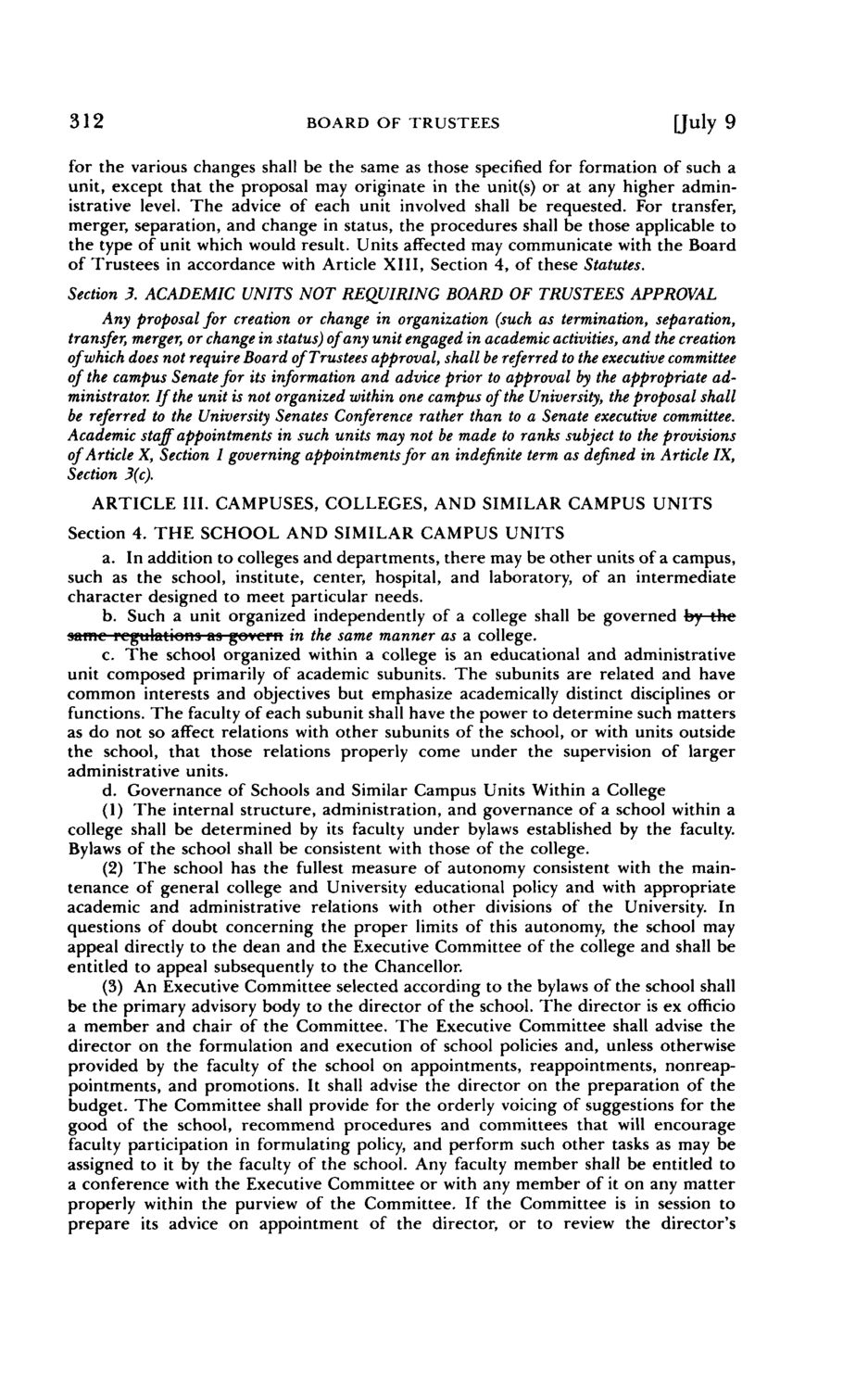| |
| |
Caption: Board of Trustees Minutes - 1992
This is a reduced-resolution page image for fast online browsing.

EXTRACTED TEXT FROM PAGE:
312 B O A R D OF TRUSTEES [July 9 for the various changes shall be the same as those specified for formation of such a unit, except that the proposal may originate in the unit(s) or at any higher administrative level. T h e advice of each unit involved shall be requested. For transfer, merger, separation, and change in status, the procedures shall be those applicable to the type of unit which would result. Units affected may communicate with the Board of Trustees in accordance with Article XIII, Section 4, of these Statutes. Section 3. ACADEMIC UNITS NOT REQUIRING BOARD OF TRUSTEES APPROVAL Any proposal for creation or change in organization (such as termination, separation, transfer, merger, or change in status) of any unit engaged in academic activities, and the creation ofwhich does not require Board of Trustees approval, shall be referred to the executive committee of the campus Senate for its information and advice prior to approval by the appropriate administrator. If the unit is not organized within one campus of the University, the proposal shall be referred to the University Senates Conference rather than to a Senate executive committee. Academic staff appointments in such units may not be made to ranks subject to the provisions of Article X, Section I governing appointments for an indefinite term as defined in Article IX, Section 3(c). ARTICLE III. CAMPUSES, COLLEGES, AND SIMILAR CAMPUS U N I T S Section 4. T H E SCHOOL AND SIMILAR CAMPUS UNITS a. In addition to colleges and departments, there may be other units of a campus, such as the school, institute, center, hospital, and laboratory, of an intermediate character designed to meet particular needs. b. Such a unit organized independently of a college shall be governed by the same regulations as govern in the same manner as a college. c. T h e school organized within a college is an educational and administrative unit composed primarily of academic subunits. T h e subunits are related and have common interests and objectives but emphasize academically distinct disciplines or functions. T h e faculty of each subunit shall have the power to determine such matters as do not so affect relations with other subunits of the school, or with units outside the school, that those relations properly come under the supervision of larger administrative units. d. Governance of Schools and Similar Campus Units Within a College (1) T h e internal structure, administration, and governance of a school within a college shall be determined by its faculty under bylaws established by the faculty. Bylaws of the school shall be consistent with those of the college. (2) T h e school has the fullest measure of autonomy consistent with the maintenance of general college and University educational policy and with appropriate academic and administrative relations with other divisions of the University. In questions of doubt concerning the proper limits of this autonomy, the school may appeal directly to the dean and the Executive Committee of the college and shall be entitled to appeal subsequently to the Chancellor. (3) An Executive Committee selected according to the bylaws of the school shall be the primary advisory body to the director of the school. T h e director is ex officio a member and chair of the Committee. T h e Executive Committee shall advise the director on the formulation and execution of school policies and, unless otherwise provided by the faculty of the school on appointments, reappointments, nonreappointments, and promotions. It shall advise the director on the preparation of the budget. T h e Committee shall provide for the orderly voicing of suggestions for the good of the school, recommend procedures and committees that will encourage faculty participation in formulating policy, and perform such other tasks as may be assigned to it by the faculty of the school. Any faculty member shall be entitled to a conference with the Executive Committee or with any member of it on any matter properly within the purview of the Committee. If the Committee is in session to prepare its advice on appointment of the director, or to review the director's
| |